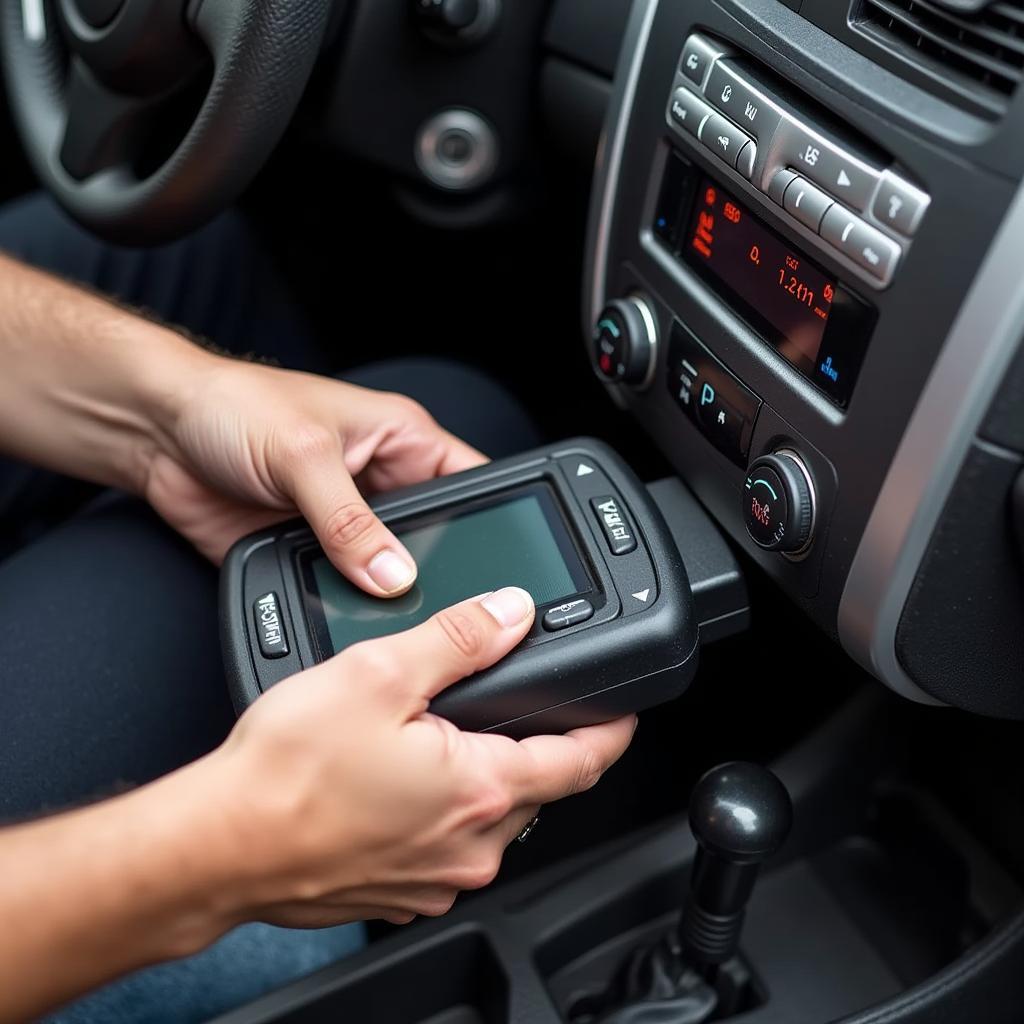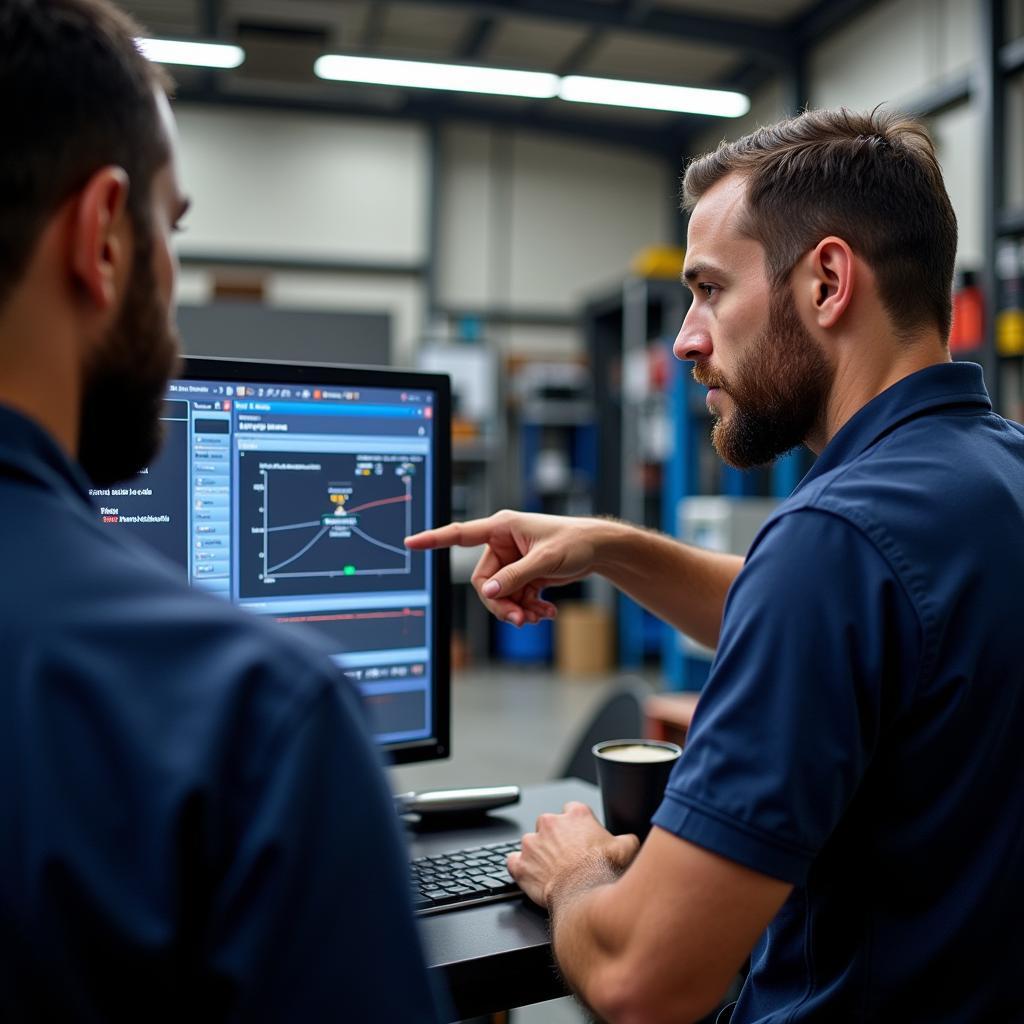Finding out what’s wrong with your car can be a stressful experience. You hear a strange noise, see a warning light on your dashboard, or maybe your car just isn’t driving the same way it used to. In these moments, a car diagnostic is your first step to understanding the problem and getting back on the road safely. But where do you go to get a car diagnostic, and what are your options? This comprehensive guide will answer all your questions about finding the right place for your car diagnostic needs.
Understanding Car Diagnostics: What They Are and Why You Need Them
Before we dive into Where To Get A Car Diagnostic, let’s quickly define what they are. A car diagnostic involves using a specialized tool, called an OBD-II scanner, to communicate with your car’s computer system. This system constantly monitors various components and sensors throughout your vehicle, storing diagnostic trouble codes (DTCs) when an issue is detected.
Think of DTCs as clues about potential problems. The car diagnostic tool reads these codes, providing valuable information about the health of your car’s engine, transmission, emissions system, and more. This data helps mechanics pinpoint the root cause of the problem, saving you time and money on unnecessary repairs.
You might need a car diagnostic if you experience any of the following:
- Illuminated Check Engine Light: This is the most common reason for a car diagnostic.
- Unusual Noises: Grinding, knocking, or squealing sounds could indicate underlying issues.
- Performance Problems: Stalling, rough idling, or reduced fuel efficiency can signal a problem.
- Emissions Test Failure: A car diagnostic can pinpoint the cause of emissions-related issues.
Where to Get a Car Diagnostic: Exploring Your Options
You have several options when it comes to getting a car diagnostic, each with its own pros and cons:
1. Auto Repair Shops:
- Mechanics: Independent garages and national chains like Midas and Meineke offer car diagnostic services.
- Pros: Experienced mechanics, potential for on-site repairs, often provide a detailed explanation of the diagnostic results.
- Cons: Can be more expensive than other options, potential for upselling unnecessary repairs.
2. Dealerships:
- Specialized Technicians: Dealerships employ technicians trained specifically on your car’s make and model.
- Pros: Access to specialized tools and software, knowledge of brand-specific issues, often provide loaner cars.
- Cons: Typically the most expensive option, might require appointments booked in advance.
3. Auto Parts Stores:
- Free or Low-Cost Diagnostics: Many auto parts stores like AutoZone and Advance Auto Parts offer free or low-cost basic code reading.
- Pros: Affordable, convenient, can help you understand the severity of the issue before seeking further repairs.
- Cons: Limited diagnostic capabilities, might only provide basic code information without further explanation.
 OBD Scanner for Home Use
OBD Scanner for Home Use
4. Mobile Mechanics:
- Convenience: Mobile mechanics come to you, offering diagnostics and repairs at your location.
- Pros: Saves time and effort, convenient for busy schedules or car breakdowns, often offer competitive pricing.
- Cons: Might have limited access to specialized tools, can be challenging to vet the mechanic’s experience and qualifications.
5. DIY Diagnostics:
- OBD-II Scanners: You can purchase your own OBD-II scanner and diagnostic software for home use.
- Pros: Empowering, can save money in the long run, allows you to monitor your car’s health regularly.
- Cons: Requires some technical knowledge, interpreting diagnostic codes can be complex, potential for misdiagnosis.
For those who prefer a DIY approach, you might want to know where to get a car diagnostic test done at home.
Choosing the Right Option: Factors to Consider
With so many choices, how do you decide where to get a car diagnostic? Consider these factors:
- Severity of the Problem: For basic code reading, an auto parts store might suffice. For complex issues, a mechanic or dealership is a better option.
- Your Budget: If cost is a concern, explore free or low-cost options first, like auto parts stores or where can i get a free car diagnostic.
- Your Technical Skills: DIY diagnostics are great for car enthusiasts, but require some technical knowledge.
- Convenience: Mobile mechanics offer the ultimate convenience, while dealerships might require appointments.
“Choosing the right place for your car diagnostic can save you a lot of headaches down the road,” says Michael Turner, a senior automotive technician with over 20 years of experience. “Don’t hesitate to ask questions about the technician’s experience and the comprehensiveness of their diagnostic equipment.”
Beyond the Diagnostic: What’s Next?
Getting a car diagnostic is just the first step. Once you know the source of the problem, you can decide how to proceed. Options include:
- Repairing the Issue: The mechanic or dealership can provide a repair estimate based on the diagnostic findings. You may be wondering [how much does it cost to get my car diagnostic](https://diagfixpro.com/how-much-does-it cost-to-get-my-car-diagnostic/), and the subsequent repairs.
- Seeking a Second Opinion: If you’re unsure about the diagnosis or the recommended repairs, getting a second opinion from another mechanic is always a good idea.
- DIY Repairs: If you’re mechanically inclined, you can use the diagnostic information to attempt the repairs yourself.
 Mechanic Explaining Car Diagnostics
Mechanic Explaining Car Diagnostics
Conclusion: Getting Back on Track with a Car Diagnostic
Understanding where to get a car diagnostic and what to expect during the process can save you time, money, and unnecessary stress. Whether you choose a mechanic, dealership, or opt for a DIY approach, a car diagnostic empowers you with the knowledge you need to make informed decisions about your vehicle’s health. Remember to prioritize reputable service providers, ask questions, and don’t hesitate to seek a second opinion when necessary. By being proactive and informed, you can keep your car running smoothly for miles to come.

Leave a Reply